The Best Movies of 2006

While many critics post their “Best Of” lists with the New Year, I prefer to wait until just before the Academy Awards. That way, I am able to ride the media buzz, to say nothing of getting a few extra months to catch all the films I’ve been unable to see.
I’ve heard some people complain that this was a bad year for movies. Excuse me? Did we see the same movies!?
I saw some terrific films this year — more, in fact, than I’ve seen in one year in a very long time. But I think I might know where they’re coming from. After all, this was the year of dark, apocalyptic filmmaking. Critic David Edelstein said it best in a
Q & A session I attended last month:
“This is the year in which that old Republican Clint Eastwood made not one but two films deploring war (Flags of our Fathers, Letters from Iwo Jima. In which the birth of the CIA signified the end of our national innocence and the spreading of evil (The Good Shepard). In which dystrophic films like Pan’s Labyrinth and Children of Men dealt with encroaching fascism and the breakdown of the social order. In which An Inconvenient Truth and even the children’s film Happy Feet dealt with the destruction of our planet.”
He has a point. For every Little Miss Sunshine there was a Borat (sure, it was hilarious, but it also reflected a grotesque picture of this country). This says a lot less about Hollywood and a lot more about the zeitgeist in which we live. They say art reflects a culture’s angst and if that’s true, we’re living in scary times.
I’ve certainly got some dark films on my favorite’s list below. Some bright, shiny ones too. Their one unifying thread is that they are all great films.
If you agree or disagree, let me know. What are your picks?
(click on any of the film titles for the trailers)
1. UNITED 93
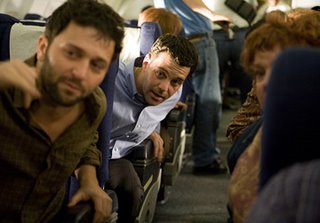
From my review:
We’re ready. It is not too soon for United 93 because United 93 does not play like a film that is aware of the five plus years of history trailing behind those tragic events. The film contains no politics. No patriotic speeches. No finger pointing. No conspiracy theories. No Iraq. No bigger historical picture. There are no mentions of the “War on Terror” or Osama bin Laden or Al-Qaeda. This is a time before anyone found those names on the tips of their tongues. United 93 is a film devoid of any sort of commentary or conclusions because it does not allow itself to have the benefit of hindsight. United 93 garnered nearly immaculate reviews. Those who are less then enthusiastic admit to its first-rate production values and even its honorable intentions, but are at a place where they are not yet ready to deal with its subject matter. Such may be some of you. But if you think you are ready to wrestle with these demons, again, I cannot recommend this film highly enough. Like other painful and deeply disturbing films such as Shindler’s List, this is not a film you go to for enjoyment, but because you feel you have a duty to endure it.
2. THE DEPARTED

From my review:
Welcome back to Scorsese’s mean streets. Scorsese has taken the Hong Kong action classic, Infernal Affairs, borrowed its very deserving skeleton, and re-packed it with the distinctly American sensibilities of gangsters, corruption and betrayal in Irish Boston. Forget what you’ve ever felt about the inadequacies of re-makes –- The Departed is a towering, ambitious achievement. But it is not for the faint of heart. This is Scorsese working with his complete bags of tricks–subtlety and nuance as well as some of the most brazen and audacious violence you’ve ever seen. That he knows what to use when, and even knows when the two can be injected into the same time and space, shows why he is a master craftsman of the medium. The Departed is also something else, rather unexpected. It is very funny. That this comedy comes hand in hand with some of the most graphic bloodletting on the screen this or any year makes its triumph all the more extraordinary. That a movie this incessantly violent, this brutal should be this much fun is almost beyond explanation. The Departed is euphorically confident and assured, made by a director who understands cinema in both its technical and its artistic veins. The result is a film that works on every conceivable level. It is for films like this–exciting, invigorating, wicked, bloody, convoluted, hilarious, and unapologetic–that we go to the movie house in the first place.
3. CHILDREN OF MEN

From my review:
I was entranced by this movie. Hypnotized. Spellbound. In a thrall. The final quarter of the film is nothing short of an evolutionary leap forward in filmmaking. There, I’ve said it. Alfonso Cuarón (The Little Princess, Harry Potter and the Prisoner of Azkaban, Y Tu Mamá También) has made a film of staggering power. All muscle and sinew, Children of Men pulses with a palpable energy and dynamism. Cuarón’s visual style is tsunami-like — exhausting, and physically capable of creating stomach-eroding ulcers in his viewers. It speaks to Cuarón's blistering talent then, that amidst this kind of bravura filmmaking he never loses sight of the film’s equally intense philosophical concerns. Children of Men’s political relevance is never muted by the action. Cuarón’s ideas may not be new, but the audaciousness of his execution is. He has directed a film with a searing immediacy and a ferocious velocity. This world of fear and hopelessness is more real than we can ever dream possible. Infertility is merely the MacGuffin, a metaphor to examine the possibility of a humankind endgame. Deep down, we know Cuarón’s future could easily be our own. And that is perhaps the most frightening thing of all.
4. LITTLE MISS SUNSHINE
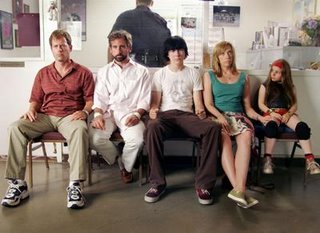
From my review:
When was the last time you went to a theater and had a genuine community experience? I'm talking about the sort of gathering in which the entire theater was as one person whose emotions moved in perfect tandem. The sort of gathering in which the film's dialogue was, at times, lost because you couldn't hear over the sound of your own uninhibited laughter. The sort of gathering that rose to their feet at the credits in boisterous, exuberant applause. If it's been a while, might I suggest Little Miss Sunshine. Part black comedy, part National Lampoon farce, Little Miss Sunshine wears its heart on its sleeve, never failing to find the bright spot in the midst of the darkest moments, nor the love and humanity in the most inhospitable situations. Heartache and laughter are handled with equal adeptness and wisdom and dignity are shown to be the by-product not of success, but of failure. Charming, moving, warm and brilliantly hysterical, Little Miss Sunshine is easily the funniest thing I have seen in a theater in years.
5. CASINO ROYALE
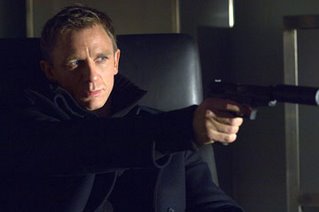
From my review:
Casino Royale isn't simply the best Bond film in years. It is one of the best Bond films ever. It is like no Bond film you've ever seen. Bond reinvented for the 21st Century. Take an ailing franchise on the verge of self-annihilation and retool it to fit the sensibilities of a world enshrouded beneath the specter of terrorism. Take one of the largest icons in cinema history, a movie titan with a proven 40-year-plus track record and make him bleed, make him cry, make him human. I was wrong about Daniel Craig. Dead wrong. Initially skeptical and even a bit hostile to the choice, he is the absolute perfect person to bring Bond, kicking and screaming, into modernity. Handsome, but with a rugged menace, Craig is nearly everything the implacable Pierce Brosnan was not. And that's exactly the point. I wonder, having opened Pandora's Box, can they ever close it again? Will we never again see Bond smooth and slightly tongue in cheek, or is the darker, grittier, more vulnerable Bond here to stay? Perfect for this film, will it prove as successful for the franchise overall? That remains to be seen. But God knows I'll be watching from my front-row seat, both shaken and stirred.
6. ALL THE KING'S MEN

From my review:
I know I'm all alone on this one. I, as a critic, can hardly ask you, the reader, to ignore the critics, but this, in my opinion, is one of those moments when you must. All the Kings Men is a film about good men gone bad. It is a film, if you believe the Holy Bible, about man's origin from dirt and the original sin from which he is incapable of escaping. It is a film about loss, deception, betrayal, unfulfilled expectations and regret. It is a film about morality and potential thrown aside in pursuit of power. It is a film about human frailty. The true tragedy of Willie Stark is not political in nature. It is personal. The true tragedy lies in the collapse of great intentions and compromised integrity. It didn't all happen at once, of course. It never does. It happens over time, in small, almost unrecognizable steps. When the mangled end comes, it is far from the luminescent beginning but one hardly noticed the journey from there to here. And great falls never occur in isolation--they always capsize the lives of those closet to them. Willie Stark may have been a good governor of the people, but his undoing was the result of the one thing he couldn't govern--his heart--"deceitful and wicked above all things," even his idealism.
7. NOTES ON A SCANDAL

From my review:
Notes on a Scandal is melodrama at its best, a nasty, wickedly good, over-the-top story with school teachers standing in where vampires usually prowl. Using a “ripped from the headlines” template, the film is a wide-eyed and delicious examination of obsession and self-delusion. Notes on a Scandal is based on a highly praised book by Zoe Heller. Adapted by Closer scribe Patrick Marber, Scandal, like the earlier Little Children, is as close as a movie can get to literature. The film is propelled by Barbara’s malevolent voiceovers which, for all their venom and distain, are nonetheless the stuff of masterful writing, words dripping with the honey of a shimmering pen. This screenplay was born to win its Oscar. Coupled with the superb writing is Phillip Glass’ breathtaking, gothic score. Suffused with his iconic minimalism, this soundtrack is edged with a darker, more brooding soot than we’ve often heard. Oscar nomination number two. The performances are towering. Dench is something sinister, lurching in and out of the shadows like a magnificent beast we stand in awe of at our own peril. Blanchett is luminous, waiflike one moment, far more aware of her true lack of innocence than she leads anyone — including herself — to believe the next. Oscar nominations three and four. A sort of Fatal Attraction meets Masterpiece Theatre, Notes on a Scandal is an examination into the mouth of madness borne on the wind of loneliness and rejection. It is an admission that the illicit greener grass most often comes with tragic dues, and an observation that fantasies that substitute for reality can often overtake our lives until our personalities are forever subsumed. A frenzy of rage and desperation, Notes on a Scandal is a compelling and disturbing psychological drama and one of the best films of the year.
8. LITTLE CHILDREN

From my review:
Little Children is a flawed film. That said, I liked it; at times, even loved it. I was entranced by Todd Field’s (the magnificent In the Bedroom) direction and Antonio Calvache’s cinematography, so gorgeous and fluent that you can’t help but be held spellbound. The adults in the film are the little children to which the title refers. They spend the entire film in various states of juvenile immaturity, only grasping hold of their mantles of responsibility in the closing moments. Better late than never, we are told; it’s never too late to start acting like a grown up. Based on Tom Perrotta's 2001 novel (Perrotta also wrote the screenplay), Little Children is about as close as a movie can get to literature—rich, nuanced, erudite and multi-layered. The film, like the book, treads a fine line between tragic satire and disquieting, uncomfortable reality, creating a world in which judgmental looks, hidden secrets, repressed desires, and deep, dark fantasies are barely kept at bay by a flimsy social order. What is perhaps most surprising of all is the realization that Little Children is a comedy—a dark, blistering comedy, but a comedy nonetheless. Little Children is far from flawless, but it remains one of this year’s most beautiful and thought-provoking films.
9. BRICK
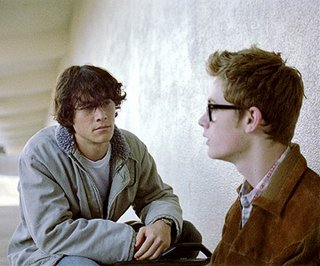
From my review:
This is the movie Dashiell Hammett or Raymond Chandler would have written were they modern high-schoolers. Brick may find its time and place in modernity but its soul is straight out of The Maltese Falcon or The Big Sleep. Brick is what it would have looked like if Bogart went to high school--an adolescent Chinatown with shades of Kurosawa, peppered with the rapid-fire, hard-boiled, cryptic speech of A Clockwork Orange and wrapped in the very deceptive skin of a teen drama. These are not soap opera teens obsessed over who’s going out with whom. Here football studs, prom queens and social misfits are unapologetic criminals, enmeshed in a seedy high school netherworld that is as real an anything their parent’s encounter--perhaps more so. If this sounds ridiculous, it doesn’t play like it. First-time director Rian Johnson’s endlessly clever and visually arresting film completely merges adolescent angst and detective-fiction into something that is odd, yes, but also audacious and engaging. It both takes itself very seriously and allows moments of dark comedic delight. This is the sort of movie you can't help but smile at, dazzled by its cheeky ingenuity. Brick is a black-comic ballet through the peculiar terrors of suburban adolescence exacerbated and magnified by a criminal underworld that is anything but carefree and youthful.
10. BABEL
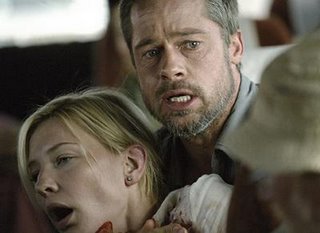
From my review:
No one Babel this film can communicate. Not people and certainly not governments. Citizens of different countries are hindered by their own linguistic barriers. Even those who speak the same language cannot connect. Not husbands and wives. Not parents and children. Not siblings. There are even those who are literally, physically unable to communicate. No gender, no class, no country is immune. Filmmaker Alejandro González Iñárritu (21 Grams) is interested in creating a unified picture that shows how the barriers of language and culture serve to divide us, but also reveal our most fundamental commonalities and connectedness. The smallest action in the smallest of countries can have a staggering ripple effect that can move like a hurricane-force gale through the halls of power of the largest and most powerful governments on the planet.
11. LETTERS FROM IWO JIMA

From my review:
What a bold, ballsy stroke of genius Clint Eastwood had when he decided to make not one, but two films about the battle for Iwo Jima—one told from the familiar perspective of the American attackers and the other from the vantage point of the Japanese defending the island. Has such a thing ever before been attempted? It seems almost unimaginable that an American director would tackle such a subject. And yet here Letters from Iwo Jima stands, having gone where no other war film has ever gone: deeply, sensitively and fairly into the mind and actions of “the enemy.” The companion piece to Eastwood’s earlier Flags of Our Fathers, Letters from Iwo Jima is a profound meditation on the brutality, waste and human cost of war. And it is not only profound because it tells the story of a familiar battle from the perspective of the enemy, but because, rather than being a testament to the courage and ultimate victory of vastly outnumbered force, it is, from beginning to end, a chronicle of inevitable and crushing defeat.
12. THE QUEEN
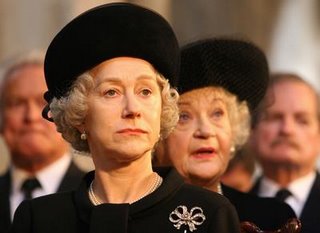
From my review:
The Queen is a hybrid picture, a microscopic examination of two houses to which we have exclusive, “backstage” passes. If, in the beginning, the royals appear callous and heartless, Blair and his cronies appear as petty and petulant children. One of The Queen’s staggering strengths is that it is capable of showing two equally correct sides of the same coin and leave you feeling as if both were equally right, and both equally wrong. This film should be required viewing for all public relations majors. Blair is a man of a new millennium, just the sort of man to lead his antiquated kingdom into a new age. And Elizabeth is a woman rooted and framed in an ancient and exquisitely beautiful tradition. Her life and activities steeped in antiquity, it is, nonetheless, a life left behind by her people. The world, for now, is not done with either of them yet. As Elizabeth struggles to maintain her personal dignity in the face of immense and anguished public scrutiny, so too must Blair recognize the titanic structures of time-honored belief upon which he stands. The Queen refuses to demonize either side—it is a testament to the film that when the credits role, you find yourself left with a great affection and empathy for both sides.
13. PAN'S LABYRINTH

From my review:
Once upon a time there appeared a dark and wonderful fairy tale for grown-ups about a young girl beset by monsters, both real and imaginary. Spanish director Guillermo Del Toro (The Devil’s Backbone, Hellboy) has made a dark, violent, R-rated fantasy that is as unquenchably imaginative as it is uniquely powerful. Sinister and disturbing, the spellbinding Pan's Labyrinth is also imbued with wonder and awesome beauty. It is one of the most unforgettable films of the year, and an unlikely voice for hope in a world increasingly spiraling out of control. Pan’s Labyrinth speaks to the very real fact that stories can help us endure anarchy and affliction by giving us a narrative framework by which we can make sense of our tumultuous lives. By contrasting the clash of good and evil in the real world with the battles that take place in fantasy realms, Del Toro acknowledges what many of us have known since we were lulled to sleep by our parents bedside stories—fables, even dark and twisted one—offer worthwhile perspectives on disquieting realities and reveal the illuminative power of childlike faith to navigate a darkening world.
14. THE LAST KING OF SCOTLAND
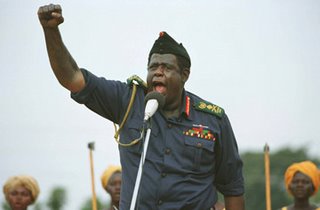
From my review:
We all know who Idi Amin is. It is no surprise when one of the most loathed figures of the 20th century begins butchering everyone in sight in a maniacal and insane quest to hold onto his power. When it was all said and done, Amin butchered hundreds of thousands of his own people. What The Last King of Scotland does so well is reveal how jovial and buoyant Amin was, a charismatic and magnetic personality that caused all around him to become instantly hypnotized. Amin’s passion is the one overarching constant of his life. That he is equally loving and charming as he is murderous and cruel is what this film is so masterful at revealing. Forest Whitaker does an extraordinary job in a tour-de-force performance that chews up the scenery without once going over the top. He portrays Amin as funny, vulnerable, tender and enigmatic — all without ever letting us forget he was a maniacal monster. Like Helen Mirren’s exquisite performance as the regal Elizabeth in The Queen, Whitaker embodies the role, channeling and not merely acting. When the film ends with clips of the actual man, you realize just how good he truly was.
15. HALF NELSON
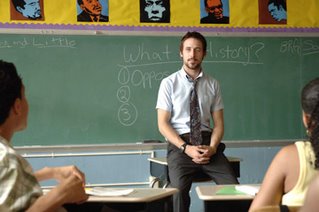
From my review:
If you’ve stayed away from this one because you think it is another recycled Stand and Deliver, a Dead Poet’s Society set in Brooklyn, think again. While Half Nelson may wear the outer garments of a traditional teacher-inspires-rough-around-the-edges-students, its heart beats to a very different drummer. Take, for instance, the fact that the inspirational teacher is hopelessly addicted to crack cocaine. Ryan Gosling, who is fast becoming known as the peerless actor of his generation, here gives a magnetizing performance as a dedicated and charismatic teacher of history at an inner-city Brooklyn middle school populated predominantly by African-American children. Don’t let the fact that he’s a coke-head fool you. Dan Dunne is a phenomenal teacher, sweet-natured and intellectually committed. He truly gives a damn about his students. And they know it. But his life is unraveling one night at a time. All the good he does during the day is threatened by nights spent feeding his habit, carousing at bars and never quite sleeping it off at his seedy, dilapidated apartment. Gosling does not play Dan as a hypocrite who takes pleasure from the fact that he continually fools his co-workers and lives only for the revels of the night. Instead, he plays him as a human being, desperately broken, trapped in a self-destructive cycle he knows is killing him and will destroy all he believes in, but is powerless to stop. Dan is a man being split apart at the seams by two conflicting extremes--idealism and cynicism. Half Nelson trades melodrama for authenticity, cliche heroics for genuine heart, cheap cinematic parlor tricks for blessed restraint.
16. Volver
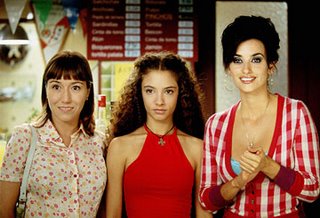
From my review:
Pedro Almodovar’s Volver is amazingly bright, fresh and clean for a film dealing with murder, adultery, incest, malignant disease and the occasional supernatural apparition. It is a testament to Almodovar’s vision that in a film in which half the characters are dead or dying, there should be this much life and vigor. Volver is a film that rejoices—opulently and ferociously—in the power and vitality of womanhood. Volver’s predominantly female cast is nothing short of magical. Maura is warmth personified, Duenas a gentle comic genius, and Portillo the sad, lost shell of a former beauty we are never allowed to see. However, as good as they are, this is Cruz’ film and she plays every scene with a luminescent intensity that easily explains her Oscar nomination. She is nothing short of radiant, exuding the sort of raw, Latin sensuality not seen since Sophia Loren.
The Ones That Got Away:
Army of Shadows
An Inconvenient Truth
Thank You For Smoking
Superman Returns
A Guide to Recognizing Your Saints
Borat
Inside Man
Venus
Marie Antoinette
A Prairie Home Companion
Stranger Than Fiction
Ones I Missed:
Inland Empire
Dreamgirls (I'm sorry, I simply have no desire whatsoever to see this one)
Blood Diamond
The Painted Veil
The Death of Mr. Lazarescu
l'Enfant
Apocolypto
Hollywoodland
For Your Consideration
The Good German
The Good Shephard
Climates
Old Joy
The Proposition
49 Up
Most of the documentaries


1 Comments:
What a nice thing to wake up to this morning!
Post a Comment
<< Home